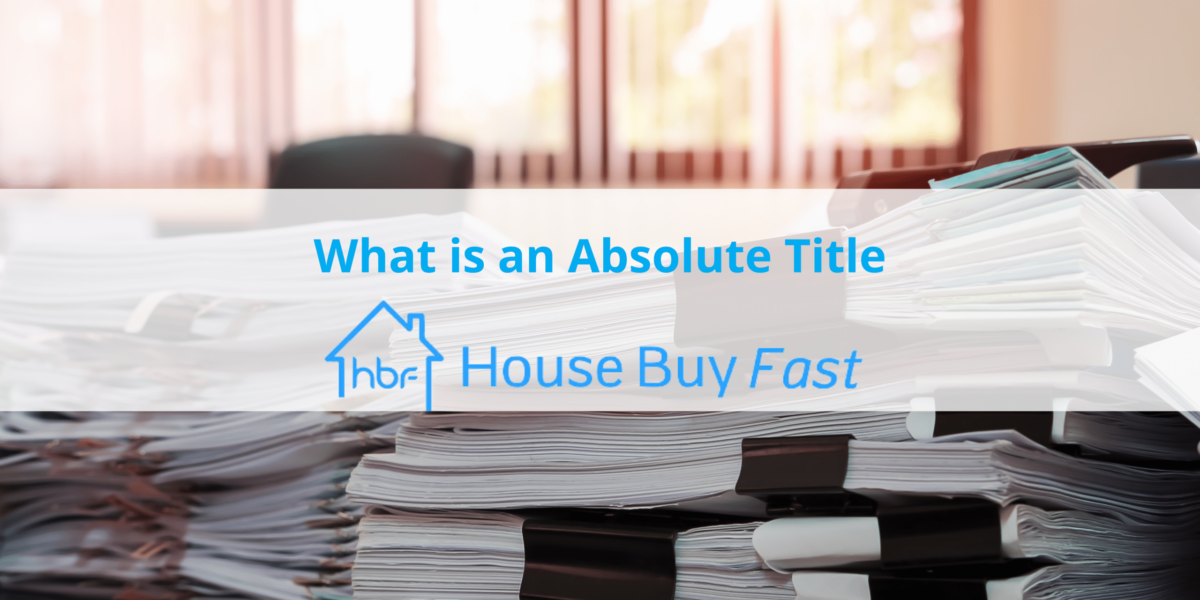Understanding property titles and title deeds is essential when you’re thinking about buying a property. Absolute Title is one of the strongest and most secure forms of property ownership. What does that mean, and why is it important?
What Is an Absolute Title?
An Absolute Title means the person named on the title has complete legal ownership of the property, which is often confirmed through a title search. This type of title offers full rights to use, sell, or lease the property without interference. It’s often called a “perfect title” because it provides the highest level of legal protection.
With an Absolute Title, the property owner can feel confident that there are no hidden claims, unpaid debts, or other legal problems affecting the ownership. The land registry title is the most desirable title for both property owners and potential buyers.
How Do You Register a Title?
To register a title according to the land registration rules , the owner must apply to the HM Land Registry, which keeps official records of land and property ownership in England and Wales. The Land Registry will issue an Absolute Title if the applicant can prove an unbroken chain of ownership going back at least 15 years.
This often involves submitting official documents that show how the property changed hands over time, reflecting the property’s title history. If the evidence is complete and clear, the Absolute Title is granted. If not, a lower form of title, like Possessory or Qualified, might be given instead.
Most properties registered today have an Absolute Title, but older properties or those passed down informally through families may not meet the criteria straight away.
Different Types of Property Title
Not all property titles are the same. Apart from the Absolute Title, there are other types you might come across:
Possessory Title
is given when there’s not enough evidence to prove full ownership, but the person applying is clearly in possession of the property.
Qualified Title
is granted when there’s a known problem or defect in the title history.
Good Leasehold
Title applies to leasehold properties and is similar to Absolute Title, but specific to leaseholders.
The type of title your property has will be shown in the Proprietorship Register, which is part of the official title documents held by the Land Registry.
Why an Absolute Title Is Important
Owning a property with an Absolute Title means you have the strongest legal rights and claim to it. There are no concerns about someone else making a claim or raising a dispute. You can sell the property with confidence, and buyers are more likely to be interested when the title is secure.
An Absolute Title also makes it easier to get a mortgage, as lenders prefer properties with clear ownership and no legal risks. It’s a key factor in protecting your investment and ensuring smooth transactions in the future.
What Does the Land Registry Say?
The Land Registry’s records include key information about the title, such as who owns the property, what type of title it is, and whether there are any outstanding legal interests or restrictions.
A title register and title plan are available for every registered property, indicating the registered proprietor and these documents are vital for both buyers and sellers. They can reveal any problems that might affect ownership or future plans for the property.
What Can Affect Your Title?
Several issues can cause problems with a property title. These include unpaid council tax, incorrect legal documents, disputes between co-owners, and ongoing divorce cases. In some situations, the property might be subject to a charge from a mortgage lender or a court order.
If there is not enough evidence to prove a clear chain of ownership, or if paperwork is missing or incorrect, the title might be considered defective. This can delay sales and may require legal action to resolve.
Can You Upgrade to an Absolute Title?
If your property currently has a Possessory or Qualified Title, you don’t have to accept that forever. It’s possible to apply for an upgrade to Absolute Title. This is done using the UT1 Form, submitted to the Land Registry, along with new or improved evidence of ownership. You will also need to pay the fee.
To support your application, you’ll usually need help from a conveyancing solicitor. They can gather the right documents, draft supporting statements, and explain the history of the property’s ownership clearly.
Upgrading to Absolute Title can make the mortgaged property more attractive to buyers, reduce legal risks, and improve your standing with mortgage lenders.
So, what does title absolute mean in practice?
Holding an Absolute Title is about more than just legal recognition – it directly affects how confidently you can use, sell, or even borrow against your property.
When you have an Absolute Title, you can:
Live in the property without concern over competing claims.
Sell the property freely to anyone, with full rights transferring to the new owner.
Lease or rent out the property as you wish.
Obtain mortgages more easily, as lenders prefer properties with Absolute Title.
In contrast, properties without Absolute Title can create delays in sales, reduce buyer confidence, and sometimes even cause sales to fall through.
For buyers, an Absolute Title means there are no hidden surprises, such as issues related to adverse possession . It shows the property is not tied up in family disputes, legal claims, or incomplete paperwork.



What the Land Registry Reveals
HM Land Registry keeps a public record for each registered property. This includes:
The class of title (such as Absolute or Possessory).
Who the registered owner is.
Whether any mortgages, charges, or restrictions apply.
Any historical ownership changes.
Anyone can request this information online for a small fee. Having a look at a property’s title register and title plan can give you insight into any risks before you make a purchase.
For sellers, it’s also a good idea to check your title status before putting a home on the market. That way, if issues exist, they can be resolved early on, saving time during conveyancing.
What Can Affect the Quality of a Title?
Even the strongest title can be undermined by certain issues. Common problems that affect property titles include:
Unpaid taxes or fees, especially council tax or service charges.
Errors in legal documents, such as typos in names or addresses.
Shared ownership or disputes between family members or ex-partners.
The mortgage company charges not correctly discharged or recorded.
Boundary disputes or claims from neighbours over land.
When these issues arise, they can cause the title to be classed as defective or incomplete. In such cases, HM Land Registry may refuse to award Absolute Title until the problems are fixed
Defective Titles and How They Impact You
A defective title is one that has legal problems. These may include past unpaid charges, errors in registration, or unresolved disputes. These issues can make it difficult to sell or even remortgage your property.
If a buyer or lender finds a defect, they may pull out or request title insurance. This is a policy that protects against financial loss if someone later challenges your ownership.
It’s best to fix the defect if possible. That might involve contacting former owners, resolving outstanding debts, or applying to correct the title at the Land Registry. A good solicitor can guide you through this process.
Common problems:
- Outstanding taxes on a property impair any absolute title.
- Title defects such as unpaid taxes and incorrect legal paperwork can impair absolute title.
- Divorce proceedings can result in claims that impair a property’s absolute title.



Where to check if the property has an absolute title?
To check if a property has an absolute title, check the official land registry records for the jurisdiction in which the property is located. Use the HM Land Registry online service to search for the title register of the property. Once you obtain the title register, look under the “Proprietorship Register” section, where the type of title will be stated. If the title is listed as “Absolute,” it means the owner has the highest level of ownership recognised by law, free from any major encumbrances or competing claims. It’s also advisable to verify that the title is not subject to overriding interests or restrictive covenants that might affect its use. For added assurance, especially when purchasing property, a solicitor or licensed conveyancer can help interpret the documentation and ensure the title is indeed absolute.
How to read the title register?
The government’s official website provides clear and practical guidance on how to read a title register, making it accessible even for those without legal expertise. Available at gov.uk, the guide breaks down each section of the register, such as the Property Register, Proprietorship Register, and Charges Register, and explains what the information means in plain language. It also includes examples and helpful tips, making it easier for individuals to understand ownership details, any restrictions or rights affecting the property, and the nature of the title, whether it’s absolute, possessory, or qualified. This resource is especially useful for buyers, sellers, or anyone conducting due diligence on a property.



